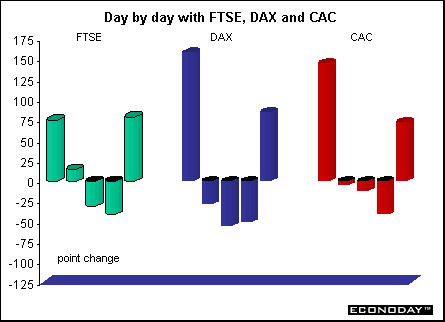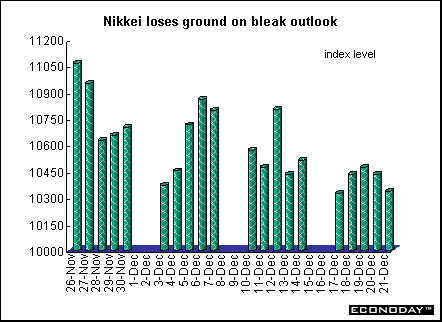 |

Britain and Europe
Europe's indexes mimicked U.S. equities and rose on Monday. The FTSE 100 built quietly on its good start to the last full trading week before year end. However, the positive strength eroded mid-week, especially in Europe, because of weak economic data and forecasts that were revised down yet again. Earnings warnings were always lurking in the background, especially for technology stocks. But on Friday, with options expirations and very limited number of trading opportunities left prior to the yearend, investors were back to the optimistic side as they squared their positions and looked forward to their holidays. Thanks to trading on Monday and Friday, all three indexes followed here - FTSE 100, Paris CAC, Frankfurt DAX - were up on the week.

Asia
Japan officially entered a recession - its third in a decade - in November 2000, according to a cabinet committee. This is five months earlier than the gross domestic product data indicate. Japan's last expansion, which began in February 1999, peaked in October last year. The committee uses industrial production, power use, department store sales and other indicators to track the economy's ups and downs. Analysts said that the dating is a more reliable indicator of where the economy is than the GDP and is confirmation of what already had been known - that the economy has been in a steep slide since the beginning of the year. The panel uses a method similar to that employed by the National Bureau of Economic Research, which declared that the U.S. economy entered a recession in March, even though gross domestic product did not shrink until the third quarter.

The Nikkei fell for the second week despite attempts at recovery midweek. Exporters' stocks rose as the yen fell thanks to verbal intervention by government officials and further monetary easing by the Bank of Japan. A cheaper yen generally means that business may pick up for exporters because their merchandise is relatively less expensive. But these prospects were overcome by worries about the impact of soaring bankruptcies and their impact on the banking system combined with gloomy economic data and somber forecasts for the rapidly sinking economy. The index is now down by 25 percent since the beginning of the year.


Introduction • Global Stock Market Indexes • Recap of Global Markets • Currencies • Indicator Scoreboard

The Bottom Line • Looking Ahead
|
 |